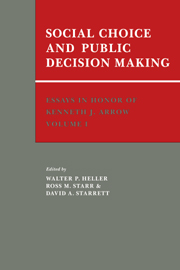Book contents
- Frontmatter
- Contents of Volumes I, II, III
- List of contributors
- Editors' preface
- Kenneth J. Arrow
- Contents
- PART I SOCIAL CHOICE
- 1 Consequentialist social norms for public decisions
- 2 Information and invariance in normative choice
- 3 Utilitarian morality in a world of very half-hearted altruists
- 4 On the implementation of social choice rules in irrational societies
- 5 Walrasian social choice: some simple axiomatic approaches
- PART II DECISION MAKING IN THE PUBLIC SECTOR
- Author index
5 - Walrasian social choice: some simple axiomatic approaches
Published online by Cambridge University Press: 05 November 2011
- Frontmatter
- Contents of Volumes I, II, III
- List of contributors
- Editors' preface
- Kenneth J. Arrow
- Contents
- PART I SOCIAL CHOICE
- 1 Consequentialist social norms for public decisions
- 2 Information and invariance in normative choice
- 3 Utilitarian morality in a world of very half-hearted altruists
- 4 On the implementation of social choice rules in irrational societies
- 5 Walrasian social choice: some simple axiomatic approaches
- PART II DECISION MAKING IN THE PUBLIC SECTOR
- Author index
Summary
This essay attempts to connect more closely competitive analysis with axiomatic social choice theory: The latter was initiated by K. J. Arrow, who also contributed prominently to the former field of study. Our findings are directly related to results obtained earlier by Hurwicz (1979), Schmeidler (1982a), and Binmore (1980c).
We deal with social choice rules, that is, correspondences associating subsets of feasible states with utility profiles that describe consumer preferences. Various requirements may be imposed on social choice rules: These requirements reflect concepts of collective rationality, ethical considerations, and/or informational constraints.
We examine social choice rules defined on a rich domain consistent with the existence of competitive equilibria for every utility profile in a finite economy context. We require them to meet three axioms: (i) full individual rationality, (ii) monotonicity in a rather weak sense, and (iii) non-discrimination among Pareto-indifferent allocations; for every rule under study, we observe that the set of competitive equilibria is a subset of the image associated with every profile.
The Walras correspondence meets our three axioms; therefore, it may be viewed as the most selective choice rule displaying these properties.
In this chapter, we develop alternative axiom sets leading to an analogous conclusion. The reader is invited to compare them to axiom sets characterizing other social choice rules. Papers by Maskin (1980) and Thomson (1981) are very useful from this viewpoint.
- Type
- Chapter
- Information
- Essays in Honor of Kenneth J. Arrow , pp. 97 - 114Publisher: Cambridge University PressPrint publication year: 1986
- 4
- Cited by



